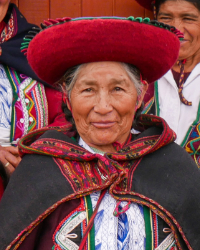Quechua, Chachapoyas in Peru

Photo Source:
Anonymous
|
Send Joshua Project a map of this people group.
|
| People Name: | Quechua, Chachapoyas |
| Country: | Peru |
| 10/40 Window: | No |
| Population: | 8,900 |
| World Population: | 8,900 |
| Primary Language: | Quechua, Chachapoyas |
| Primary Religion: | Ethnic Religions |
| Christian Adherents: | 40.00 % |
| Evangelicals: | 2.00 % |
| Scripture: | Unspecified |
| Ministry Resources: | No |
| Jesus Film: | No |
| Audio Recordings: | No |
| People Cluster: | Quechua |
| Affinity Bloc: | Latin-Caribbean Americans |
| Progress Level: |
|
Introduction / History
The Quichua or Quechua are a cluster of indigenous peoples who are direct descendants of the inhabitants of Incan Empire. Before the arrival of the Spanish in the early 16th century, the Incas ruled an empire from Columbia to Chile. They are perhaps the largest indigenous people in the Americas. The common thread among the Quichua is that they still speak Quechua, the language of the Incas. Modern Quechua has many dialects. Some of them are mutually unintelligible.
During the days of the Incan Empire, the ancestors of the Quichua built excellent roads and buildings. At the time of the Spanish conquest, the Quichua had their land taken from them. The Spanish used the land to form large estates. Indigenous people became virtual slaves. Old World diseases brought by the Spaniards killed hundreds of thousands of Quichua. Over the years the Quechua language and culture have been suppressed by the Spanish speakers.
In recent years, some of the South American governments have tried to return some the land to the Quichua peoples.
The Chachapoyas live in northern Peru in the eastern foothills of the Andes Mountains. They were known as fierce warriors who resisted being conquered by the Incas. They built stone cities that one can visit today. The Chachapoyas were finally overcome by the sheer number of Incan soldiers. The Chachapoyas speak their own dialect of Quechua. No resources are currently available in Chachapoyas Quechua.
What Are Their Lives Like?
The first potato harvests came from the Quechua hundreds of years before the coming of the Spanish. The Chachapoyas Quichua people are farmers who grow potatoes as a staple food. They also grow peanuts, yuccas, sweet potatoes, maize, coriander, beans, barley and chili peppers. Those who live at high elevation are more likely to be livestock herders. They herd and eat llamas, sheep and goats. Quichua women make colorful clothing, artwork and mats which they sell to get money.
Unfortunately, most Quichua in Peru live poverty today. Some young Quichua people are moving to Spanish speaking cities looking for a better life.
What Are Their Beliefs?
Though the Chachapoyas Quichua people are officially Roman Catholic, they blend this with their ancient religions. Old gods are given the names of Catholic saints. They have a procession featuring a statue of the Virgin Mary followed by a mass. Mary is joined to the ancient Earth Mother goddess. The parade features sacrificed animals, alcohol and cigarettes for the ancient gods. Drunkenness is sadly a big part of these festivals. Mountain spirits called Apus, are part of the syncretic belief system of the Quichua.
When the Quichua get the Bible in their language, many become open to the gospel. The Chachapoyas are one of the few Quechua people who resisted the Roman Catholic Church and cling to their old religion.
What Are Their Needs?
The Quichua peoples need to understand the Bible and the teachings of Jesus Christ. They need to take God at his word and abandon all remnants of false religions. The Quichua need to see Biblical Christianity shown to them in practical ways.
Prayer Points
Pray for the Lord to move among the Chachapoyas Quechua of Peru, giving them a desire for the purity and forgiveness of Christ.
Pray for the Lord to thrust out loving workers to the unreached Quichua peoples throughout South America.
Pray for the Quichua to be convicted of sin and drawn to God's righteousness in Christ.
Ask the Lord to raise up Quichua pastors who can lead and teach their people.